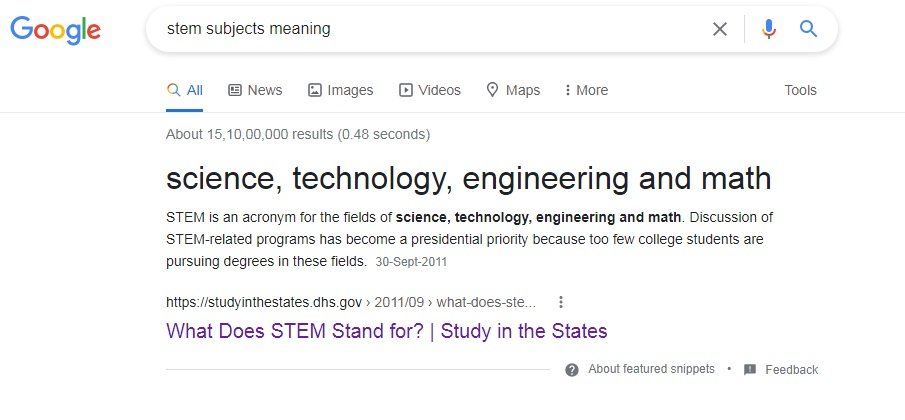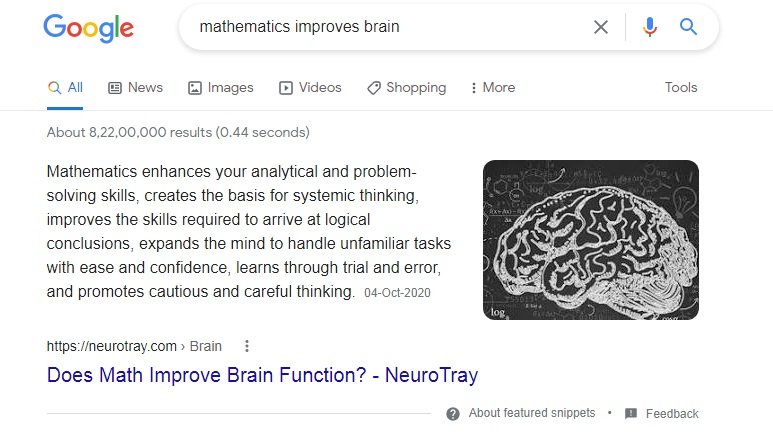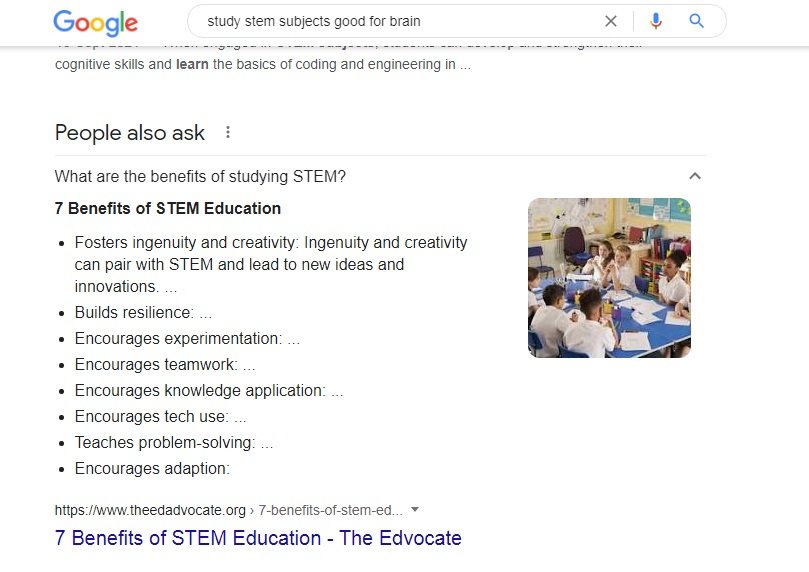
The above linked article “What Does STEM Stand for?” gives us some concrete hint on why the United States needs to hire and import so high a number of ‘STEM Brain’ from all around the world including India! |

So now you know what is exactly meant by the acronym of STEM. But just knowing that it stands for Science, Technology, Engineering and Mathematics does not make everything as clear as it should be. We will even stumble to the most basic question like what is meant by Science or what is inclusive in Technology or why Technology and Engineering are taken separately.
Let us try to find some answers to some of these questions. Obviously we cannot go too deep into this right now right here as these questions very soon and very easily would lead us into deeper philosophical domains famously and most notoriously known as philosophy of Science and Foundation of Science. Here we cannot afford to go in those domains and hence would have to keep things as simple and lucid as possible.
Let us see what we should understand by Science. Science most obviously includes those fundamental subjects like Physics, Chemistry and Biology. There are many divisions of all the above three disciplines and they are naturally inclusive.
Till this it was easy and obvious. But the question does not end right here. There can be much controversy on the possibilities of inclusion of many other subjects that do not fall under the domain of fundamental Science but are still very well considered as disciplines of Science. Examples can be like psychology, economics, and so on.
Even more controversies can arise as often we attach the word Science to many other subjects sociology and political science. And these controversies are not going to end any sooner. You can see in the above image of Wikipedia definition of STEM subjects, they mention the controversies regarding these issues.
There can be an easy solution for this. I would discuss this elsewhere in detail as this can easily be coined as a hot research topic. Still I will give some hints over here.
In usual trends, psychology, economics and sociology are called social sciences. But if we look deeply then we can find something very interesting. If we take it by definition the social sciences are to be taken as those disciplines which are formed due to formation of social structures. Like economics and sociology are formed out of social structures and are more like man made.
But we cannot have the same view for psychology. It is true that psychology has immense roles and implications in social structures but we cannot say that psychology formed out of social structures. It is more near to and related to biology than sociology or social science. Psychology can be taken as equivalently fundamental as biology, because it is not only present and active in human beings but also can be found among other animals with developed mental functions.
So by that logic, we can take all the naturally occuring fundamental subjects within the definition of Science. And by the same logic, subjects like economics, sociology and political science are not much inclusive within the definition of fundamental sciences, but sometimes for the sake of studies we can consider them as extended science.
Thus in the question of inclusions in Science in the context of STEM, I think it will be better and safer to include all the fundamental Science disciplines under the tag header of Science.
Next question is the definition of technology and engineering and also the differences between them. What should we understand by engineering and technology?
Engineering –
Both engineering and technology imply almost similar things but with slight differences in perspectives. Engineering is more fundamental than the term technology. There are so many laws and theories under the domain of fundamental Science and not too many always have direct applications in people’s lives. But with passing days we are finding more and more scopes and possibilities of applications.
Thus the disciplines of study that bridge up the gap between the fundamental theories and their applications are usually called engineering. Thus engineering is very closely related to fundamental Sciences and extract applicational theories and models out of them.
Technology –
Now that we have got an idea about engineering then the next obvious question can be like what technology actually means and how it is related or different from engineering? To be more precise, technology is in one sense an application of engineering. When engineering gives us certain devices and principles then that forms a technology and there arise multiple scopes for its applications and further development and improvement.
For example, electronics is a branch of engineering that gave us computers, which is a device and also a set of applications, totally that we usually call computer technology. When computers are intensely and dedicatedly used for information processing then we call it information technology.
A person can pursue studies in only engineering sectors or can take up studies in only technology sectors or sometimes he may choose to take up all the two simultaneously. The more one moves towards the depth of any technology, the more he enters the domain of engineering. The more one moves towards the depth of any engineering, the more he enters the domain of fundamental sciences.
The next one is Mathematics for which the ‘M’ of the acronym STEM stands for.
“Mathematics is the queen of the Sciences and number theory is the queen of Mathematics”
– Carl Friedrich Gauss
Just the way Gauss said it about Mathematics, it is indeed the topmost pursuit in all domains and disciplines of Sciences and hence in STEM as well. We cannot find any scientific discipline that does not need to use Mathematics.
Previously some subjects like biology did not use mathematics but now they have all evolved and developed so much that mathematics is becoming one major and indispensable tool for understanding and explaining many deep and complex areas or topics.
This is a question that can have multiple angles and multiple views. But as our topic of discussion now is about how to get smart by studies or pursuit of STEM so I will try to remain around that angle of view only. So what do we understand about getting smart?
I have used this term as a camouflage of self-development. By getting smart means getting development of the self, in terms of personal as well as social and also economic angles. How can one develop personally, socially and economically through the studies of STEM subjects and thus emerge as ‘smart’?
Shall I say economy first? Ok that’s the easiest deal I suppose. So let it be first. But do I really have to say it at all? I wonder!
Even an average engineer earns near or over lakh per month after a few years of experience. A very average doctor earns even more than that within just a couple of years after they pass out.
The management schools are filled with more students of science and technology background compared to other backgrounds. Even most of the national and international services sectors are overwhelmingly acquired by science students in majority of the cases.
The options of small jobs also are wider for science students than other students. So by this overview we can understand that economy wise STEM students are likely to get a better position than the other counterparts.
That was just one page of the whole story book. It’s true that we cannot go through the whole story of STEM education over here, but we can browse a few pages easily.
In the personal sphere, your brain development and utilization is one of the most vital and effective factors which determines your mental performances and build.


I think that’s enough to say about how STEM education can make our brain healthier and sharper. Too many things can be said about this, so many that it can take a treatise. But as I said above that we do not have that scope here to delve into such depths, so I am just trying to give you an outline, an idea about the actual story.
A sharper brain, better thinking and analyzing, a good cognitive and memory function, as a good problem solver, as a better creator or innovator, all adds to what we actually should perceive as being smart. Thus STEM education does make us smarter.
So what can happen without adequate STEM education?
It’s so simple, if adequate STEM education can make you personally, socially and economically smarter, the inadequate STEM education can be supposed to make you less smart. And will you enjoy that at all, or desire something like that?
Everyone wants to become intelligent and smart. But the problem is if one does not use intelligence, or underuse it then there are full chances of it to decline. That’s the way natural rules are made. So we have to use it if we want to keep it, and use it even more if we want to increase it. And exactly this is the reason that made me conclude that STEM education can be one of the best bets for this purpose.
In discussion about society, the first concern comes in economics. As I said above, STEM education can make anyone better in personal finance prospects. Once you have money then you can use it for your family and society. Either for good or for bad. But if you do not have money then there remains no choice at all.
If we look deeper then we can see that most of our social mechanisms are functioning on the wide shoulders of STEM education. Let me give you a couple of examples to make that more clear.
Recently we underwent a very extraordinary and critical condition of Covid-19 pandemic. Now let us see how we survived and came out of the crisis. We can see that it is only the people of STEM education who remained functional and paved the way out of the pandemic for us. From doctors to nurses, from scientists to technologists, they are the one who contributed knowledge, resources and devices which helped us to deal with the overall situation and ultimately today we are in a better position than the last couple of years. No other education and no other profession carried as much significance and role for mankind to fight this global crisis. Would you disagree with me on this?
Similarly, if you look deep into your daily living, then you can easily find how science and technology is participating with you and helping you to run your life smoothly, safely and productive. All we cannot ignore the impact of STEM education in this perspective. Thus lack of adequate STEM education can create more than enough adverse effects on our social structure and growth.
When talking about STEM education, we need to keep in mind that we should not only be concerned about the quantity but also very analytical on the quality as well. Just having too many students pursuing STEM education or having too many STEM professionals would not do much good at all. Quantity is important, but quality is even much more important.
Poor quality STEM professionals can not only contribute less to our society at large, but can even contribute negatively to quite a dangerous extent. Let me give one small example.
Suppose one locality does not have a doctor, that is really a great problem. People may need to travel quite a distance to get one. But if someday a doctor of inferior quality appears there and people feel so much relief about that. But the doctor, being not so efficient, started to provide ill treatment to his patients and as a result the sufferings and mortality rate of that locality increased considerably. So what good can that bring to that locality or society?
Hence the question should have more emphasis on quality than ok quantity of STEM students and professionals. And nothing can be better than if we can generate both quantity and quality simultaneously. And that is usually too tough to materialize, and exactly there we can get it stuck.
I was talking about the quantity and quality of students and professionals of STEM subjects. And in both the cases, inspiration and motivation plays a very crucial pivotal role. Much more crucial that one can ever imagine.
In the case of quantity, economic advantages and employment possibilities are among the major motivating factors in most of the third world and growing economic regions. High population load and resulting competition on resources can be acting as a major catalyst to the process. Perhaps that is why, in India we find such an enormous number of STEM graduates all over.
But for quality the story goes almost the opposite. Where there is a rush of quantity there is a scarcity of quality. In rich and developed countries, the number of STEM pursuants are usually very low, but the quality of their pursuit is better as sometimes telescopic scales. The quality of nurturing infrastructure can be one determinant, but the role of proper student and teacher attitudes cannot be anyhow undermined or denied. Opulence of tangible and intangible awards are also among greatest behavior modifiers in those cases.
Everyone needs to learn from those development environments which foster high quality STEM students and professionals. Education institutes and governance system has to work on this. Emphasizing on quantity over quality of STEM education can never generate a good future for the nation, society and the whole of mankind anyhow.
As I said above, if plenty of good quality STEM students is the vision then an adequate and appropriate environment plays the most vital role. And educators are perhaps the most functional factor determining the education environment.
Educators are not only teachers but also include all who will be responsible for strategic development of educational policies, pedagogy methods and other related aspects. And teachers are the terminal node for the delivery of education to the students.
Infrastructures, policies and methods all should be in proper alignment for holistic development of STEM education. But there are a lot of obstacles and hindrances in this of which the greatest perhaps is the lack of proper STEM education awareness among the educators. Actually the educators were also students once and the lack of proper STEM education environment was functional then also. That may have hindered proper STEM education awareness and this becomes an iterative or recursive problem to continue through generations.
What can be the way out from this recursion? The answer is perhaps re-education of the educators. Responsible educators need to be properly re-educated in productive STEM education environment aspects and factors.
When I say about education infrastructure then schools are perhaps of the highest priority. It is true that our home is also equally or even more instrumental in proper educational development. But little can be done about the holistic environment of the home by external agents like governance and social systems. On the converse, they have full access and authority on the education systems and they can take the advantage to modulate that for better education delivery including STEM education optimization.
Schools should nurture proper inspirational models for inspirational development of STEM subject aptitude in the students. Students may require academic support, social support, economic support or even emotional support from their schools, depending case to case. Schools should ideally be equipped for providing those support to the students as that is exactly the purpose of schools. Schools are not just to take tutorials, give assignments and conduct exams. They have much higher roles to play but are subject to realization in most cases.
Current developments in the DO IT YOURSELF (DIY) model of classrooms and laboratories are particularly instrumental and effective in nurturing a new generation of STEM oriented students. But just declaring a DIY model would not be sufficient. Enough funds, properly trained teachers and other appropriate environment factors are very essential for proper development of STEM education culture in the schools and education organizations.
Thus if one would study STEM to become smart, in every way as I said above, then it is supposed that the education systems and the schools would also be smart in making their students smart. Afterall a smart system can only output another smart product. And STEM schools and STEM teachers are expected to be smart enough (without any excuses).

To read the complete blog please visit later